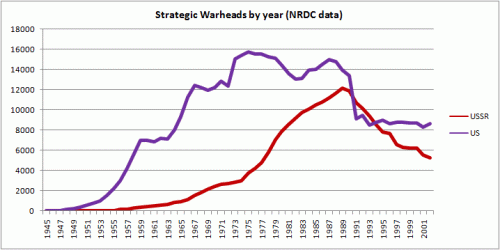bobbymike said:
Avimimus said:
Combined ICBM, SLBM and Air-dropped strategic warheads by year...
I should have been more specific with the concern with Soviet ICBM's growing numbers and accuracies (USSR surpassed the US in ICBM's in 1968) and the growing first strike threat, because the type of strategic warhead and its basing for warfighting is relevant. How many US air dropped weapons would never leave CONUS, how many SLBM warheads would be destroyed at the dock? There was real concern the SS-18 alone could wipe out most of the ICBM's, B-52's at air bases and SSBN's in port leaving the US with only 'counter value' targets but leaving the Soviet's a mssive force for follow on strikes at US cities.
Would the US go 'counter value' with SLBM's if Russia took out their ICBM's? ICBM's have always been the greatest concern for both sides as, until the D5, they were the only forces capable of a counter force first strike.
The subject of SLBMs destroyed at the dock keeps popping up in various forums, and there seems to be some misunderstanding about them. The number of SLBMs in the strike calculus is based on the number of subs at sea. It is assumed that any subs at the docks, undergoing maintenance, etc. will most likely be lost, or at best not available for any kind of "early" action. At least in the past, that was one of the factors that sized the boomer fleet: if you want x number of available warheads at any given time you must have y number of submarines, sufficient so that the deployed percentage gives you your planning number. The rest are "offline", even if they're in perfect working order, either at the dock or in storage (I'm ignoring for the moment missile subs in transit that are not in the patrol area). For treaty purposes, the total number of warheads/launchers are counted, but what's actually expected to be available is less. This is already factored in, or at least it was in the past.
Of course, this is true for the other two legs of the triad to a certain extent. While arguably the most vulnerable, the land based ICBM fleet probably has the largest percentage of warhead availability. Bombers are somewhat problematic. The B-1 allegedly no longer has any nuclear capability. B-52s have been continuously updated, but how survivable they are against a peer threat is an open question. The B-2, of course, is stealthy, but apparently hasn't been updated that much since delivery. More importantly, the availability of full capability units is reportedly appalling.


